GRAMMAR
PRACTISE ENGLISH TENSES
http://www.englishguide.sk/test-english-tenses-review-1/
Active / Passive Overview
Active
Passive
Simple Present
Once a week, Tom cleans the house.
Once a week, the house is cleaned by Tom.
Present Continuous
Right now, Sarah is writing the letter.
Right now, the letter is being written by Sarah.
Simple Past
Sam repaired the car.
The car was repaired by Sam.
Past Continuous
The salesman was helping the customer when the thief came into the store.
The customer was being helped by the salesman when the thief came into the store.
Present Perfect
Many tourists have visited that castle.
That castle has been visited by many tourists.
Present Perfect Continuous
Recently, John has been doing the work.
Recently, the work has been being done by John.
Past Perfect
George had repaired many cars before he received his mechanic's license.
Many cars had been repaired by George before he received his mechanic's license.
Past Perfect Continuous
Chef Jones had been preparing the restaurant's fantastic dinners for two years before he moved to Paris.
The restaurant's fantastic dinners had been being prepared by Chef Jones for two years before he moved to Paris.
Simple Future
willSomeone will finish the work by 5:00 PM.
The work will be finished by 5:00 PM.
Simple Future
be going toSally is going to make a beautiful dinner tonight.
A beautiful dinner is going to be made by Sally tonight.
Future Continuous
willAt 8:00 PM tonight, John will be washing the dishes.
At 8:00 PM tonight, the dishes will be being washed by John.
Future Continuous
be going toAt 8:00 PM tonight, John is going to be washing the dishes.
At 8:00 PM tonight, the dishes are going to be being washed by John.
Future Perfect
willThey will have completed the project before the deadline.
The project will have been completed before the deadline.
Future Perfect
be going toThey are going to have completed the project before the deadline.
The project is going to have been completed before the deadline.
Future Perfect Continuous
willThe famous artist will have been painting the mural for over six months by the time it is finished.
The mural will have been being painted by the famous artist for over six months by the time it is finished.
Future Perfect Continuous
be going toThe famous artist is going to have been painting the mural for over six months by the time it is finished.
The mural is going to have been being painted by the famous artist for over six months by the time it is finished.
Used to
Jerry used to pay the bills.
The bills used to be paid by Jerry.
Would Always
My mother would always make the pies.
The pies would always be made by my mother.
Future in the Past
WouldI knew John would finish the work by 5:00 PM.
I knew the work would be finished by 5:00 PM.
Future in the Past
Was Going toI thought Sally was going to make a beautiful dinner tonight.
I thought a beautiful dinner was going to be made by Sally tonight.
MIND
MIND ako sloveso najčastejšie prekladáme ako “prekážať, namietať“. Ako si nižšie spomenieme, typické pre MIND sú záporné vety (v nich ho často prekladáme ako “byť jedno” napr. I do not mind… – Je mi jedno…) a otázky.
MIND rovnako znamená aj “dávať pozor na niečo“. Ak chcete niekoho upozorniť, že sa pred ním nachádza schod, aby sa nepotkol alebo aby napr. nerozbil okno apod., sloveso MIND je rovnako vhodné.
- Mind you don’t smash that window.
MIND ako podstatné meno znamená najčastejšie “myseľ“, “myšlienky“, “intelekt (= rozum)“, “zmýšľanie” apod.
V ďalšej časti článku poukážem na najčastejšie chyby s týmto slovom:
- I don’t
mindto getolder. - I don’t mind getting older.
Sloveso MIND sa takmer vždy vyskytuje v záporných vetách a otázkach (ako to vidíte v príklade vyššie). Často avšak nastáva problém, že študenti za MIND používajú INFINITÍV, čo je samozrejme chyba. Správna štruktúra vyzerá takto:
(NOT) MIND DOING sth
-
- Would you mind closing the door?
 Pozn. dávajte si pozor na zmenu vo význame. Porovnajte:
Pozn. dávajte si pozor na zmenu vo význame. Porovnajte:1. Would you mind me closing the door?
-
- Prekážalo by vám, ak by som ja zatvoril dvere?
2. Would you mind closing the window?
-
- Prekážalo by vám, ak by ste vy zatvorili dvere?
- It was snowing heavily but we didn’t
mind it. - It was snowing heavily but we didn’t mind.
Ak predmet slovesa MIND vieme pochopiť z kontextu ako vo vete vyššie, po MIND nenasleduje zámeno.
- A: „Do you mind opening the window?“
- B: „No, I don’t mind.“ (nie I don’t mind IT.)
Ako si teda môžeme všimnúť PODMETOM pri slovese MIND je JEDINEC, ktorému niečo prekáža.
- I don’t mind. (= Neprekáža mi to.)
MATTER
MATTER ako sloveso prekladáme ako “mať význam (pre čo), záležať (na čom)“. Skupina Metallica naspievala pieseň, ktorú pomenovala veľmi hodiaci sa do nášho kontextu:
- “Nothing Else Matters.” – Na ničom inom nezáleží.
MATTER ako podstatné meno znamená najbežnejšie “záležitosť (=vec)“, s predložkou OF “otázka čoho“, či “hmota“, “látka” apod.
Rovnako nebudú chýbať ani najčastejšie chyby:
-
The matteris that I don’t have enough money to buy it. - The problem is that I don’t have enough money to buy it.
MATTER sa vo význame „problem“, či „trouble“ používa hlavne v otázkach a záporných vetách (a to po ANYTHING, NOTHING, WHAT). MATTER v tomto význame typické pre kladné vety nie je, jedine ak nasleduje po SOMETHING. Preto vo vete vyššie je lepšie použiť slovo PROBLEM namiesto MATTER. Všimnite si nasledujúce vety:
- What’s the matter? (= Čo sa deje?)
- What’s the matter with your hand?
- There’s something the matter with my hand.
- Is anything the matter?
- There’s nothing the matter. (= Nič sa nedeje.)
Doesn’t matterthe size.- The size doesn’t matter.
Z vyššie uvedenej chyby si môžeme odvodiť jedno základné použitie slovesa MATTER vo význame (ne)záležať. Ukážeme si to na dvoch základných štruktúrach:
- IT DOESN’T MATTER + clause. (= It doesn’t matter if you are tall or short. = Na tom nezáleží, či si vysoký alebo nízky.)
- SUBJECT (= podmet) + DOESN’T MATTER. (= It doesn’t matter. = Na tom nezáleží.)
Ako ste si mohli všimnúť, PODMETOM vety s MATTER je OBJEKT, o ktorý (ne)prejavujeme mimoriadny záujem, inými slovami ku ktorému (ne)pociťujeme osobný vzťah.

Skúsme preložiť vetu:
- Na psoch mu veľmi záleží.
PODMETOM vety bude to, na čom MU záleží (= HIS DOGS)
Veta bude teda vyzerať takto:
-
- His dogs matter a lot to him.
Všimnite si, že MATTER sa spája s predložkou TO, ak po ňom nasleduje OSOBA (= somebody).
- The dentist told me that
there wasn’t any matter; it was just tooth decay. - The dentist told me that nothing was the matter; it was just tooth decay.
Je lepšie používať v podobných prípadoch ustálené slovné spojenia ako:
- NOTHING / SOMETHING is the matter
- THERE IS NOTHING / SOMETHING the matter
-
ALL VS WHOLE
http://www.grammarbank.com/all-vs-whole.html
1. The word order is different:
All + the + noun
The + whole + noun
I have read the whole book.
I have read all (of) the book.
2. We don’t use whole with uncountable nouns. It is mostly used with singular countable nouns.
Anderson spilled all the water on his laptop. (not … the whole water)
The whole town burnt down in a big fire in 1886.
3. They both can be used with plural countable nouns, but with different meanings.
All of the students failed in the exam. (every student)
I need to finish three whole books by the end of the week. (entire books)
4. Whole can be used after a possessive adjective, however, all must be used before a possessive adjective.
My whole life / all my life
My whole day / all my day
5. All has a meaning similar to every, but it is used with a plural noun.
Every student deserves a talented teacher.
All students deserve a talented teacher.PRACTISE:
http://www.grammarbank.com/all-vs-whole-exercise.html
BEEN or GONE
With the present perfect tense we can use both been and gone.
Been is the past participle of be.
Gone is the past participle of go.
Use been to describe completed visits. If you have visited a place on holiday and then returned you have been there.
If someone visits a place but has not come home they have gone there.
She's been to India on holiday three times.
She's gone to Moscow, she will be back next week.
When you ask someone about their past experiences use been.
You smell of beer! Have you been drinking?
Have you ever been to Paris?Note: In British English 'been and gone' is an expression which means someone/something came along and then left.
Has John arrived yet?
He's been and gone. He was here but he had to leave suddenly.What time does the postman usually come?
He's been and gone. There was no post for you today.PRACTISE:
http://www.ecenglish.com/learnenglish/lessons/been-or-gone
FREQUENT MISTAKES
Below are some of the most common English mistakes made by ESL students, in speech and in writing.
-
Wrong I have visited Niagara Falls last weekend. Right I visited Niagara Falls last weekend. -
Wrong The woman which works here is from Japan. Right The woman who works here is from Japan. -
Wrong She’s married with a dentist. Right She’s married to a dentist. -
Wrong She was boring in the class. Right She was bored in the class. -
Wrong I must to call him immediately. Right I must call him immediately. -
Wrong Every students like the teacher. Right Every student likes the teacher. -
Wrong Although it was raining, but we had the picnic. Right Although it was raining, we had the picnic. -
Wrong I enjoyed from the movie. Right I enjoyed the movie. -
Wrong I look forward to meet you. Right I look forward to meeting you. -
Wrong I like very much ice cream. Right I like ice cream very much. -
Wrong She can to drive. Right She can drive. -
Wrong Where I can find a bank? Right Where can I find a bank? -
Wrong I live in United States. Right I live in the United States. -
Wrong When I will arrive, I will call you. Right When I arrive, I will call you. -
Wrong I’ve been here since three months. Right I’ve been here for three months. -
Wrong My boyfriend has got a new work. Right My boyfriend has got a new job. (or just "has a new job") -
Wrong She doesn’t listen me. Right She doesn’t listen to me. -
Wrong You speak English good. Right You speak English well. -
Wrong The police is coming. Right The police are coming. -
Wrong The house isn’t enough big. Right The house isn’t big enough. -
Wrong You should not to smoke. Right You should not smoke. -
Wrong Do you like a glass of wine? Right Would you like a glass of wine? -
Wrong There is seven girls in the class. Right There are seven girls in the class. -
Wrong I didn’t meet nobody. Right I didn’t meet anybody. -
Wrong My flight departs in 5:00 am. Right My flight departs at 5:00 am. -
Wrong I promise I call you next week. Right I promise I’ll call you next week. -
Wrong Where is post office? Right Where is the post office? -
Wrong Please explain me how improve my English. Right Please explain to me how to improve my English. -
Wrong We studied during four hours. Right We studied for four hours. -
Wrong Is ready my passport? Right Is my passport ready? -
Wrong You cannot buy all what you like! Right You cannot buy all that you like! -
Wrong She is success. Right She is successful. -
Wrong My mother wanted that I be doctor. Right My mother wanted me to be a doctor. -
Wrong The life is hard! Right Life is hard. -
Wrong How many childrens you have? Right How many children do you have? -
Wrong My brother has 10 years. Right My brother is 10 (years old). -
Wrong I want eat now. Right I want to eat now. -
Wrong You are very nice, as your mother. Right You are very nice, like your mother. -
Wrong She said me that she liked you. Right She told me that she liked you. -
Wrong My husband engineer. Right My husband is an engineer. -
Wrong I came Australia to study English. Right I came to Australia to study English. -
Wrong It is more hot now. Right It’s hotter now. -
Wrong You can give me an information? Right Can you give me some information? -
Wrong They cooked the dinner themself. Right They cooked the dinner themselves. -
Wrong Me and Johnny live here. Right Johnny and I live here. -
Wrong I closed very quietly the door. Right I closed the door very quietly. -
Wrong You like dance with me? Right Would you like to dance with me? -
Wrong I go always to school by subway. Right I always go to school by subway. -
Wrong If I will be in London, I will contact to you. Right If I am in London, I will contact you. -
Wrong We drive usually to home. Right
We usually drive home.
Zapamätajte si, že väzba IN THESE DAYS v angličtine neexistuje. Slovenskému spojeniu “v dnešnej dobe / dnes” zodpovedá v angličtine väzba “THESE DAYS“, ktorú však zaraďujeme do menej formálneho štýlu.
Medzi neutrálne príslovky s týmto významom patrí NOWADAYS.
-
- Nowadays people live longer…
- These days children keep on watching TV.
- Politicians make promises they don’t mean to keep these days.
-
V hovorovej angličtine sa v tomto význame môžete stretnúť aj s výrazom TODAY.
Možno ste sa niekedy stretli s väzbou IN THOSE DAYS. Takéto slovné spojenie existuje, no používa sa iba pri opise minulosti s významom “vtedy – v tej dobe“.
- In those days young people didn’t have a lot of money to spend on themselves.
-
Bežne a často používate “According to me …”? Viete o tom, že je to jedna z ďalších častých chýb? Chcete sa jej vyhnúť? Preštudujte si potom tento článok.
Ak sa nás v slovenčine niekto spýta na náš názor, často začíname vetu väzbou “PODĽA MŇA …” Keďže “PODĽA ČOHO” v angličtine prekladáme ako ACCORDING TO, logicky teda vyplýva, že “PODĽA MŇA” by sme mali preložil ako ACCORDING TO ME. Avšak, to je chyba! Ako je to možné?
- According to me, you should drink two bottles of milk a day.
- According to me, he should call her.
- According to me, you should eat more.
-
V angličtine teda takáto väzba nie je v poriadku. ACCORDING TO používame vtedy, keď ide o informáciu získanú z “iného zdroja” (= osoby). Angličtina túto väzbu nespája s prvou osobou jednotného ani množného čísla. Namiesto toho sa používajú väzby so slovami OPINION a VIEW, či slovesami THINK, BELIEVE apod.
- In my opinion, you should drink two bottles of milk a day.
- In my view, he should call her.
- From my point of view, it wasn’t her fault.
- To my mind this one is much better.
- I think you should eat more.
-
Ak teda nevyjadrujeme svoj názor, ale názor niekoho iného, väzbu ACCORDING TO použiť môžeme.
- According to him, I am cleverer than I look.
- According to my mother, it’s all for my own good.
-
LOOK AFTER
postarať sa o koho/čo, starať sa o koho/čo
- I look after my brother while my mother is away.
- I don’t know but there needs to be someone to look after young kids like you that lose someone.
-
LOOK BACK (ON)
bilancovať čo (pozerať sa späť, obzrieť sa)
Premýšľame o niečom, čo sa stalo v minulosti – používame frázové sloveso LOOK BACK (ON).
- I just have to look back on all the good times I had with him.
-
LOOK DOWN ON
povyšovať sa nad koho
LOOK DOWN ON používame vo význame myslieť si, že niekto je lepší alebo dôležitejšie ako niekto iný.
- He never looked down on anyone, he was such a good person.
-
LOOK FOR
hľadať koho/čo, pátrať po kom/čom
- No one understands why we lose such important people but we just have to look for peace within ourselves.
-
LOOK FORWARD TO
tešiť sa na čo
- I am looking forward to seeing you.
- I am looking forward to you.
-

Po LOOK FORWARD TO nasleduje ďalšie sloveso v gerundiu (s ing príponou). TO v tomto prípade nie je časť infinitívu, ale predložka “NA”, po ktorej ak nasleduje sloveso, musí byť v tvare gerundia.
LOOK INTO
skúmať čo (problém, prípad ap.), zaoberať sa čím, prešetriť niečo
LOOK INTO používame, ak skúmame nejaké fakty o problémoch, situáciach, dejoch apod.
- We need to divide up the work and look into the research that needs to be done.
-
LOOK ON
prizerať sa na čo/čomu
LOOK ON používame vtedy, ak hovorím, že sa na niečo pozeráme, niečomu sa prizeráme, no bez toho, aby sme sa do činnosti, ktorú pozorujeme aktívne zapojili.
- You can look on as the animals continue their daily activities.
-
LOOK OVER
prezrieť (si), preletieť čo (zbežne skontrolovať)
Ak niečo veľmi rýchlo preletíme (prečítame, preskúmame…), používame LOOK OVER.
- Let me look over the observations you took down.
- I looked over the text because I didn’t have time.
-
LOOK OUT
Pozor!
- Look out! Somebody is coming!
-
LOOK OUT FOR sth
mať sa na pozore pred čím, vyzerať čo (či sa neobjaví)
LOOK OUT FOR sb
starať sa o koho, dávať pozor na koho
- I was told to look out for my younger brother.
-
LOOK TO
spoliehať sa na koho/čo, očakávať niečo od niekoho
- We are looking to you to give him a helping hand.
-
Toto frázové sloveso sa vyskytuje predovšetkým v týchto troch väzbách:
- LOOK TO someone
- LOOK TO someone FOR something
- LOOK TO someone TO DO something
-
LOOK UP
A. vyhľadať, nájsť čo (v slovníku)
LOOK sth UP používame vo význame “vyhľadať” vtedy, ak hľadáme niečo v knihe, zozname, počítači, slovníku, časopise apod.
- Look this word up in your dictionary!
-
B. zájsť za kým na návštevu, navštíviť
LOOK sb UP používame vo význame “navštíviť“, ak sme niekoho dlhý čas nevideli a náhodou sa vyberieme na výlet do mesta, kde dotyčný človek býva. Cestou po meste sa rozhodneme, že zájdeme na návštevu k danému známemu.
LOOK UP TO
obdivovať, ctiť koho, vzhliadať ku komu/čomu
- I really look up to my mother.
- I looked up to my teacher when I was a kid.
-
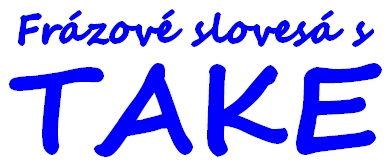
TAKE AFTER

byť po kom, byť podobný komu
TAKE AFTER používame vtedy, ak sa mladší člen rodiny podobá na staršieho člena rodiny (napr. vlastnosťami alebo výzorom).
- I don’t take after my mother at all.
- Who do you take after in your family?
-
TAKE APART
rozložiť, rozmontovať
- I am taking my bicycle apart to see what’s wrong with it.
-
TAKE BACK

vrátiť, odniesť (chybný / nevyhovujúci tovar do obchodu)
- The T-shirt was too small so I took it back.
-
vziať späť (odvolať niečo, čo sme povedali)
- I know I accused him of lying, but I take it all back.
-
TAKE (SOMEBODY) IN
ubytovať u seba
- We are going to take in two lodgers (= dvoch podnájomníkov).
-
zadržať (hlavne polícia)
- The police will take in your brother for questioning.
-
Vo význame “naletieť komu na čo“, “dať sa oklamať” - sa TAKE IN používa najčastejšie v pasíve. Teda BE TAKEN IN BY SB / STH.
- I was taken in by him.
- Too many pensioners were taken in by the government.
-
TAKE (SOMETHING) IN
porozumieť (v zmysle chápať)
- I couldn’t take in his explanation.
- It’s very difficult to take it in.
- There was so much information to take in from the text book.
-
zúžiť (oblečenie)
TAKE OFF

vzlietnuť (vznieť sa) (napr. lietadlo)
- The plane is due to* take off at 6.
- Being an astronaut is a lot of hard work and when planes take off it is probably one of the hardest jobs.
-
rozbehnúť sa / uchytiť sa (napr. biznis, autor, firma…)
- His new song has really taken off.
-
* Ak štruktúre DUE TO nerozumiete, prečítajte si tento článok – “BUDÚCNOSŤ”: Iné spôsoby vyjadrenia budúcnosti
TAKE (SOMETHING) OFF
vyzliecť si niečo, vyzuť si niečo
- When he came home he took his shoes off.
-
TAKE (SOMETHING) OUT
vytiahnuť, vybrať
- I will have to go to see the dentist to take my tooth out.
-
vybaviť si (zobrať si) (napr. pôžičku, poistenie apod.)
- It’s high time he took out an insurance policy. (= poistka)
- I didn’t want to take out a mortgage (= hypotéka) on my house but I had no option.
-
TAKE (SOMEBODY) OUT

pozvať niekoho niekam
- It was my intention (= mal som v úmysle…) to take her out for a dinner.
- My brother took his girlfriend out for a dinner.
-
TAKE OVER
prevziať, ovládnuť (napr. podnik apod.)
- He will take over the company after his father’s death.
TAKE UP
začať sa venovať čomu (nejakej činnosti)
- I took up playing football when I was six.
- I think we should take up softball or another sport that we could enjoy.
zaberať (čas, miesto apod.)
- This computer takes up too much space on my desk.
zaoberať sa čím (= prerokovať, čo)
- This issue will be taken up at the next meeting
- We can take up that part later when it becomes a problem.
TAKE TO

obľúbiť si koho / čo
- She took to my mother immediately.
- The first time we played football we took to it.
TAKE ON
prijať, nabrať si (zodpovednosť, náročnú úlohu)
- Don’t take on more than you can handle (= zvládnuť).
- Katy refused take on more responsibility.
TAKE (SOMEBODY) On
zamestnať
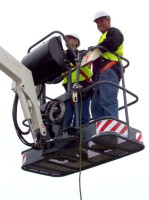
Ak niekto začne niekoho zamestnávať – teda niekoho zamestná, používame frázové sloveso TAKE ON.
- The shop has taken on 30 employees this year.
- They are planning to take on more workers during the season.
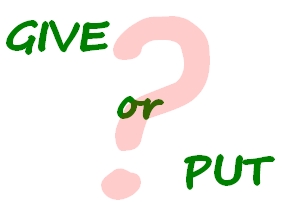
GIVE (sloveso) -> dať niečo (niekomu) - napr. či už nejaký predmet (hmotnú vec), alebo dať niekomu napr. radu (nehmotnú vec)
- Give me that pen.
- Could you please give her an advice what to do?
-
PUT (sloveso) -> položiť / dať niečo (niekde)
- She put her glasses on the shelf.
- Where did she put the key?
-
Teraz, keď sme sa oboznámili so základným významom týchto slov, môžme sa zamerať na časté chyby:
- Daj tú tašku na stoličku.

-
Ktoré z týchto dvoch slov by ste použili? Poviete si…
DAŤ niečo niekde -> DAŤ znamená GIVE, a teda:
Give that bag on the chair.-
Je to však NESPRÁVNE. A prečo? Zamyslíme sa. V základnej definícii sme si povedali:
- GIVE -> dať niečo NIEKOMU (jedna osoba dáva niečo druhej osobe)
- PUT -> dať (položiť) niečo NIEKDE
-
Stolička je vec. My tú vec nedávame NIEKOMU, ale NIEKDE (na plochu stoličky), a preto PUT (nikdy nie GIVE)!
Ešte raz si to zopakujme:
- GIVE -> dať niečo niekomu
- PUT -> položiť niečo (= predmet) niekde (na stôl, podlahu, pohovku, stoličku apod.)
-
Iné významy a časté väzby (pre pokročilejších):
PUT (= to write sth) = zapísať si (čo)

- She was asked to put her name down.
-
PUT (= to express sth) = vyjadriť sa slovami
- Jane wanted to tell him how much she had missed him but she didn’t know how to put it into words.
-
GIVE (= to cause sth) = spôsobiť niečo

- The warm weather gave me an appetite.(= The warm weather made me hungry.)
-
GIVE (to organize sth) = organizovať
- They were giving the best parties ever.
-
GIVE (= to try sth)
- You’re clever enough to go to university, you should definitely give it a go. (…, mal by si to určite vyskúšať.)
-
REPORTED SPEECH
Dear students, on this tab you can find all sorts of grammar stuff we deal with in our classes together with online exercises in which you can train the structures or just revise for tests. Hope you find it helpful.
Nepriama reč (reported speech / indirect speech) v angličtine.
online EXERCISES (just click on the link)
say or tell: http://www.perfect-english-grammar.com/say-or-tell-exercise-1.html
posun časov: http://www.englisch-hilfen.de/en/exercises/reported_speech/backshift.htm
príslovkové určenia času - zmeny: http://www.englisch-hilfen.de/en/exercises/reported_speech/time_phrases.htm
http://www.englisch-hilfen.de/en/exercises/reported_speech/statements2.htm
príslovkové určenia miesta - zmeny:
zmeny v zámenách: http://www.englisch-hilfen.de/en/exercises/reported_speech/pronouns.htm
nepriama reč - oznamovacie vety: http://www.englisch-hilfen.de/en/exercises/reported_speech/statements.htm
http://www.perfect-english-grammar.com/reported-speech-exercise-9.html
http://www.englisch-hilfen.de/en/exercises/reported_speech/sentences.htm
http://www.perfect-english-grammar.com/reported-speech-exercise-12.html
http://www.perfect-english-grammar.com/reported-speech-exercise-11.html
http://www.perfect-english-grammar.com/reported-speech-exercise-1.html
nepriama otázka: http://www.englisch-hilfen.de/en/exercises/reported_speech/questions.htm
http://www.perfect-english-grammar.com/reported-speech-exercise-6.html
http://www.perfect-english-grammar.com/reported-speech-exercise-7.html
http://www.perfect-english-grammar.com/reported-speech-exercise-2.html
nepriamy príkaz: http://www.englisch-hilfen.de/en/exercises/reported_speech/commands.htm
http://www.perfect-english-grammar.com/reported-speech-exercise-3.html
záporný príkaz: http://www.englisch-hilfen.de/en/exercises/reported_speech/commands_negations.htm
Nepriama reč (reported speech / indirect speech) v angličtine.
PRIAMA REČ (DIRECT SPEECH) NEPRIAMA REČ (INDIRECT SPEECH / REPORTED SPEECH) - PRIAMU REČ používame vtedy, ak podávame niekoho prejav v presne tom znení, ako bol hovoriacim podaný – presne opakujeme hovoriaceho slová.
- Na uvedenie priamej reči používame úvodzovky (” “)
- Výrok reprodukujeme bez akejkoľvek zmeny.
- NEPRIAMU REČ používame vtedy, ak chceme reprodukovať (prerozprávať) obsahovo presne, čo hovoriaci povedal, no nie podaním doslovného výroku (za použitia presných slov hovoriaceho).
- V nepriamej reči dochádza k zmene zámen i slovesných časov.
- Sloveso vo vete, ktorá uvádza výrok je zvyčajne v minulom čase.
- Výrok z priamej reči posúvame v nepriamej reči o jeden čas “naspäť”. Navyše, na uvedenie nepriamej reči nepoužívame úvodzovky (” “)
“I am happy.” - “I am happy,” Fiona said.
- “I am happy,” said Fiona.
- Fiona said: “I am happy.”
“I am happy.” - She said (that) she was happy.
Stavba vety
- Uvádzacia veta (so slovesami ako SAY / TELL / ASK apod. zvyčajne v minulom čase)
- Veta, ktorá samotný reprodukovaný výrok obsahuje.
-
reporting clause
reported clause
He said,
“I need your love.”
He said
he’ll help me.
Slovesá SAY / TELL v uvádzacích vetách
Nepriamu reč načastejšie uvádzajú slovesá SAY / TELL. Nie sú však jediné, no robia najväčšie problémy. V akých štruktúrach / väzbách sa používajú sa viac dočítate v tomto článku: Kameň úrazu #3 – SAY, TELL, TALK, SPEAK. Pri nepriamej reči je znalosť tejto dvojice veľmi dôležitá, preto si tento článok rozhodne dôkladne preštudujte.
Ďalšie situácie
http://www.myenglishpages.com/site_php_files/grammar-exercise-reported-speech.php
http://www.usingenglish.com/quizzes/102.html
http://www.examenglish.com/grammar/B1_reported_speech.htm
Zmeny v nepriamej reči
Zmeny (slovesných) časov
Pri tvorbe nepriamej reči z priamej reči sa na sloveso po uvádzacej vete v minulom čase (napr. She told me that …) uplatní súslednosť časov. Výrok z priamej reči posúvame v nepriamej reči o jeden čas “naspäť”:
- prítomný čas jednoduchý → minulý čas jednoduchý
- prítomný čas priebehový → minulý čas priebehový
- predprítomný čas jednoduchý → predminulý čas jednoduchý
- predprítomný čas priebehový → predminulý čas priebehový
- minulý čas jednoduchý → predminulý čas jednoduchý
- minulý čas priebehový → predminulý čas priebehový
- budúci čas s “WILL” → would
- be going to → was / were going to
-
PRIAMA REČ NEPRIAMA REČ “I study hard,” he said. He said (that) he studied hard. “I am studying hard,” he said. He said (that) he was studying hard. “I have studied hard,” he said. He said (that) he had studied hard. “I have been studying hard,” he said. He said (that) he had been studying hard. “I studied hard,” he said. He said (that) he had studied hard. “I was studying hard,” he said. He said (that) he had been studying hard. “I will study hard,” he said. He said (that) he would study hard. “I am going to study,” he said. He said (that) he was going to study hard. - He told me he had hated science at school. (= veta v priamej reči: “I hated science at school.“)
-
Minulý čas jednoduchý sa mení na predminulý, no často ho pri prevode z priamej do nepriamej reči môžeme vo vete ponechať bez zmeny, najmä vtedy, ak veta obsahuje príslovkové určenie času alebo čas je z kontextu logicky známy a jasný.
- All students knew (that) the war (had) started in 1939.
-

Predminulý čas sa nemení!
Minulý priebehový ostáva zvyčajne bez zmeny, ak ho prevádzame do nepriamej reči.
- “I was cooking the dinner while Peter was listening to the radio.” → He said he was cooking the dinner while Peter was listening to the radio.
-
Predminulý čas v nepriamej reči sa môže vzťahovať až k trom odlišných časom v priamej reči. Presný význam nám vždy naznačí kontext, z ktorého daná veta pochádza:
- “I‘ve done my homework.” → She said she‘d done her homework.
- “I did my homework last week.” → She said she‘d done her homework the week before.
- “I‘d done my homework before, but I did it again.” → She said she‘d done her homework before.
-
Zmeny pri modálnych slovesách
- WILL → WOULD
- CAN → COULD (ALEBO WOULD BE ABLE TO)
- SHALL → WOULD
- SHALL v ponukách a návrhoch → SHOULD
- MAY (ak vyjadruje “možnosť”) → MIGHT
- MAY (ak vyjadruje “povolenie”) → COULD
- MUST (ak vyjadruje “istotu”) → bez zmeny
- MUST (ak vyjadruje “povinnosť”) → HAD TO / MUST
- COULD / MIGHT / OUGHT TO / USED TO / WOULD → bez zmeny
-
PRIAMA REČ NEPRIAMA REČ “I will study hard,” he said. He said (that) he would study hard. “I can sing very well,” he said. He said (that) he could sing very well. “We shall help you,” he said. They said (that) they would help me. “”Shall I open the window,” he said. He aked if he should open the window. “I may be back later,” he said. He said (that) he might be back later. “You may do it,” he said. He said (that) we could do it. “He must have some problems,” she said. She said (that) he must have some problems “I must do it,” he said. He said (that) he had to do it. Zmeny pri príslovkách
Príslovky a príslovkové určenia z priamej reči do nepriamej meníme nasledovne:
PRIAMA REČ NEPRIAMA REČ here there now then / at that moment today, tonight, this morning / week … that day, that night, that morning / week … tomorrow the next / following day yesterday the day before, the previous day ago before last night / month the night / month before, the previous month next week / year the next / following week / year - ‘I’ll wait for you here tomorrow,’ I said. → I told her I would wait for her there the next / following day.
-

Keď zámena THIS / THESE používame v príslovkových určeniach času, meníme ich na THAT / THOSE.
- this month → that month
- these years → those years
-
Ak tieto zámena nie sú súčasťou príslovkových určení časov, postupujeme nasledovne. Porovnajte!
- “This book is interesting,” Fiona told me.
→ Fiona told me (that) the book was interesting -
Ak THIS / THESE / THAT / THOSE používame ako “prídavné meno” - nachádza sa pred podstatným menom, nahrádza ho v nepriamej reči “THE“.
- “This is an interesting book,” Fiona said.
→ Fiona said (that) it was an interesting book. -
Ak THIS / THESE / THAT / THOSE používame ako “zámeno” - nenachádza sa pred podstatným menom, nahrádza ho vo v nepriamej reči “IT“, poprípade “THEY / THEM“.
Zmeny pri zámenách
Zámena sa v nepriamej reči pri reprodukovaní výroku z priamej reči menia podľa toho, kto reprodukuje koho priamu reč. Dôležitým faktorom je aj to, komu ju reprodukuje. Všetky tieto zmeny vychádzajú vždy z daného kontextu. Všimnite si!
- “I love you.” sa v nepriamej reči zmení na napr. She said she loved me.
-
V priamej reči máme zámeno “I”- je to človek, ktorý výrok hovorí. Ak vetu prevedieme na nepriamu reč, musíme i toto zámeno zmeniť. Ak nemáme kontext, je veľmi komplikované určiť kto – komu niečo hovorí, preto sa vždy riadime podľa kontextu.

Kedy k zmene (slovesných) časov nedochádza?
Ak sloveso (said, told apod.) uvádzajúce nepriamu reč je v prítomnom čase.
Prítomný čas v uvádzajúcej vete vyjadruje, že výrok padol iba nedávno a je stále relevantný / aktuálny. V takýchto prípadoch nedochádza k zmene časov.
- “I‘m hungry.” → Peter says he‘s hungry.
-
Ak výrok obsahuje všeobecné pravdy, stále stavy apod.
- “Water boils at 100 °C.” → She said that water boils at 100 °C.
-
Ak hovoriaci reprodukuje výrok hneď po tom ako bol vyslovený.
- “I will take a bus,” she said. → She said she will take a bus. (bezprostredné / okamžité reprodukovanie, ktoré je aktuálne)
- “I will take a bus,” she said. → She said she would take a bus. (neskoršie reprodukovanie, ktoré je už neaktuálne)
-
Ak niečo, čo hovoriaci povedal stále platí (je aktuálne). Toto použitie sa vzťahuje hlavne na situácie, kedy je v priamej reči budúci čas. V takom prípade ho bez zmeny ponechávame aj v nepriamej reči.
- She said that she will cook the dinner. – Povedala, že mi uvarí – stále na to čakám.
- She said that she would cook the dinner. – Povedala, že mi uvarí – už na to nečakám (buď mi už navarila alebo nie)
-
Ak reprodukujeme vety, ktoré obsahujú druhý alebo tretí kondicionál.

- Druhý kondicionál: “If I won the lottery, I would travel the world,” she said.
-
→ She said (that) if she won the lottery, she would travel the world.
- Tretí kondicionál: “If I had taken a taxi, I wouldn’t have missed the plane,” she said.
-
→ She said (that) if she had taken a taxi, she wouldn’t have missed the plane.
Ak reprodukujeme výrok, ktorý je v podstate citátom.
- Dalai Lama said that we can never obtain peace in the outer world until we make peace with ourselves.
-
Ak reprodukujeme nejaký príbeh / historku, nie je za potreby meniť minulý čas na predminulý.
- “I was waiting for my wife, and I saw what happened,” he said.
-
→ He said he was waiting for his wife and saw what happened.
PAST PERFECT (SIMPLE AND CONTINUOUS)
Predminulý čas jednoduchý & Predminulý čas priebehový
Základná stavba

- someone had played
-
ZÁPOR:
- someone had not played
-
OTÁZKA:
- had someone played?
-

- someone had been going
-
ZÁPOR:
- someone had not been going
-
OTÁZKA:
- had someone been going?
-
Predminulý čas jednoduchý (past perfect simple)
Predminulý čas používame vtedy, ak chceme ujasniť, že dej, o ktorom hovoríme, prebehol ešte pred nejakým iným minulým dejom.
- I knew I had forgotten my keys.
-

Ak sa nad predminulým časom zamyslíte, určite si položíte jednu dôležitú otázku. Ako by sa veta zmenila, ak by sme namiesto predminulého času použili obyčajný minulý čas. Pozrite sa na nasledujúci príklad:
1. When we arrived, the film had started.
2. When we arrived, the film started.
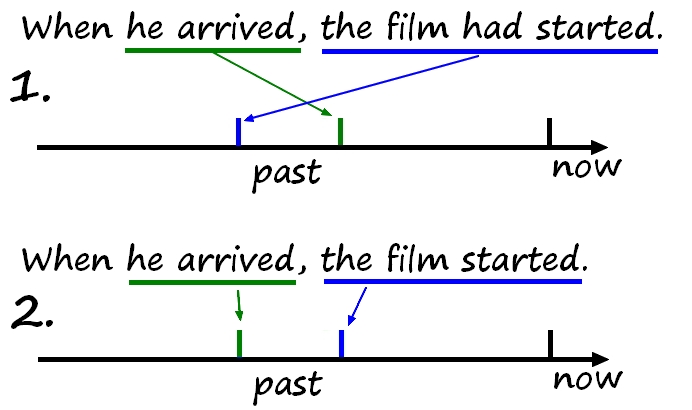
1. V prvej vete uvádzame, že keď sme prišli, film už bežal (začal pred našim príchodom). V tejto vete zdôrazňujeme to, že začiatok filmu sme napr. nevideli – začiatok sa odohral pred našim príchodom.
2. V druhej vete uvádzame, že sme najprv prišli a potom film začal. Minulý čas nám hovorí o tom, ako sa deje odohrali v chronologickom poradí (ako šli presne za sebou – jeden po druhom).
Predminulý čas používame pre ukončené deje, ktoré mali viditeľné výsledky v minulosti.
- My mother was very happy because she had met him.
Predminulý čas používame rovnako so slovesami HOPE / INTEND / EXPECT, ak hovoríme o plánoch, ktoré neboli splnené / uskutočnené:
- I had hoped to talk to him but he was not at home.
Predminulý čas môžeme použiť aj vo vetách, kde priamo uvádzame čas.
- I got to work at six but John had arrived at five.
Porovnajte rovnako PRESENT PERFECT s PAST PERFECT:
- The window is open. I have opened it.
- The window was open. I had opened it.
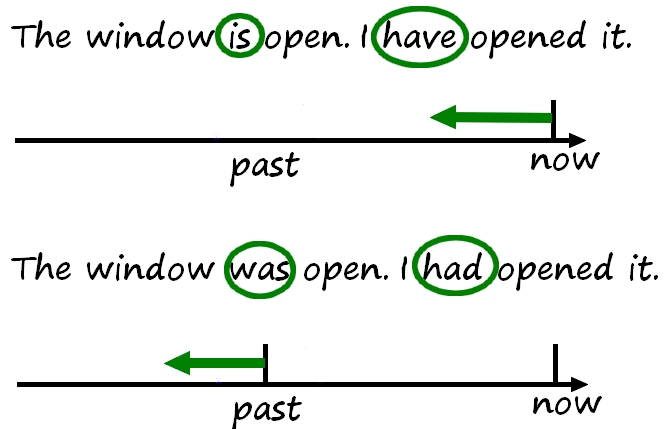
PAST PERFECT SIMPLE and PAST SIMPLE
Predminulý čas jednoduchý vs. minulý čas jednoduchý
1) Predminulý čas nepoužívame vtedy, ak hovoríme, že niečo jednoducho v minulosti (pred nejakým časom) prebehlo.
- I am reading an interesting book. I borrowed it from the library yesterday. (! NIE
I had borrowed it from the library yesterday.) – nie je tu potreba použiť predminulý čas
2) Predminulý čas nepoužívame vtedy, ak popisujeme deje, ktoré sa odohrali jeden za druhým. Ak sa však nejaký z chronologického poradia vymaní, predminulý použiť môžeme.
- My father got in the car, started the engine and looked at us.
Najprv nasadol do auta, potom ho naštartoval a neskôr sa na nás pozrel. – takto sa deje v skutočnosti odohrali.
Predstavme si inú situáciu: Prídeme do školy, tašku položíme na stôl, otvoríme ju, vybalíme si veci a v tom si všimneme, že sme kľúče nechali doma.
Všetky deje idú pekne za sebou, odohráva sa jeden dej za druhým, avšak dej “zabudnutia kľúčov” sa odohral pred všetkými ostatnými – preto pre tento konkrétny dej použijeme predminulý čas (…..I realized I had left my keys at home.)
3) Spojky AS SOON AS, WHEN, ONCE a ďalšie…Tieto spojky používame vtedy, ak hovoríme o dejoch, ktoré sa udiali jeden po druhom. Predminulý čas v týchto vetách nie je potrebný, pretože sa v rozprávaní posúvame od jedného deja k druhému. Deje nasledujú v chronologickom poradí, z vety je to viditeľné:- After she wrote the letter, she went out.
V týchto vetách však môžeme použiť aj predminulý čas bez výraznej zmeny vo význame:
- After she had written the letter, she went out.
Ak je našim cieľom zdôrazniť, že dej vo vedľajšej vete nemá priamy súvis s dejom v hlavnej vete, je od deja v hlavnej vety oddelený / nie je na ňom závislý – používame predminulý čas.
-
- After he had cleaned the car, he went for a walk for an hour.
Ak však chceme zdôrazniť, že druhý dej je výsledkom prvého, preferujeme použiť minulý čas jednoduchý pre oba deje:
- Virginia Evans became famous after she published her work.
BY s predminulým časom
Predminulý čas používame často s BY + určitým časom, ak chceme vyjadriť, čo sa do danej doby stalo.
- I had completed my studies by 2010.
BY sa nachádza často aj vo väzba BY THE TIME (THAT). Predminulý čas umiestňujeme do hlavnej vety, pričom hneď po BY THE TIME (THAT) sa používa minulý čas.
- By the time we arrived, the film had already started.
Predminulý čas priebehový (past perfect continuous)
1) Dej, ktoré prebiehal určitý dobu pred nejakým iným minulým dejom.
- We had been waiting there for more than three hours when they finally arrived.
- She had been working there for two years when she broke her leg.
2) Jeden dej viedol k inému deju
- My legs hurt because I had been plaing football all day. - Aký dej viedol k stavu “bolesti nôh” – dej hrania futbalu
Rovnaké použitie nájdeme aj pri PRESEN PERFECT. Porovnajte:
-
- My T-shirt IS dirty. I HAVE been working in the garden.
- My T-shirt WAS dirty. I HAD been working in the garden.
3) Dôraz na trvaní deja
Ak dávame dôraz na čas, počas ktorého dej prebiehal používame predminulý priebehový čas.
Ak je pre nás výsledok / efekt deja dôležitejší, použijeme predminulý čas jednoduchý.
- She‘d been working in the garden. She was dead tired. (= dôraz na trvaní deja)
- She‘d worked in the garden. It looked great. (= dôraz na výsledku deja)
Ak hovoríme o tom ako dlho sa niečo dialo do nejakého bodu v minulosti, kladieme si teda otázku HOW LONG – používame predminulý čas priebehový.
Ak hovoríme o tom, koľko krát sa niečo udialo do nejakého bodu v minulosti, kladieme si teda otázku HOW MUCH / HOW MANY - používame predminulý čas jednoduchý.
- She had been playing football for 3 hours when they arrived. (= for 3 hours…)
- I‘d heard the result many times before. (= many times…)
Porovnajte PREDMINULÝ ČAS PRIEBEHOVÝ a MINULÝ ČAS PRIEBEHOVÝ:
- When we came, they had been watching TV. (= prišli sme po tom, čo dopozerali TV – dej pozerania TV prebehol pred našim príchodom)
- When we came, they were watching TV. (= prišli sme a oni práve pozerali TV – dej prebiehal počas toho ako sme prišli)
PAST PERFECT and PAST SIMPLE
http://www.englishguide.sk/minuly-cas-jednoduchy-priebehovy-vs-predminuly-cas/
MINULÝ ČAS (jednoduchý / priebehový) vs. PREDMINULÝ ČAS
- When Lisa arrived home, John did his homework.
- Keď Lisa prišla domov, John si napísal svoje domáce úlohy.

MINULÝ ČAS JEDNODUCHÝ sme použili v oboch vetách. Prečo? Pretože MINULÝ ČAS JEDNODUCHÝ používame vtedy, ak chceme uviesť deje v takom poradí, v akom sa odohrali (jeden po druhom).
- NAJPRV Lisa prišla domov, POTOM John začal písať jeho domáce úlohy.
-
- When Lisa arrived home, John was doing his homework.
- Keď Lisa prišla domov, John si práve robil svoje domáce úlohy.

V jednej vete sme použili MINULÝ ČAS JEDNODUCHÝ, v druhej vete naopak MINULÝ ČAS PRIEBEHOVÝ. Prečo? Tieto dva časy používame veľmi často v kombinácii (ako vidíme vyššie). V určitý okamih v minulosti istý dej PREBIEHAL. Prebiehajúci dej v angličtine často určujeme časovým určením (THIS TIME YESTERDAY, AT 6.30 …) alebo iným dejom, ktorý do UŽ prebiehajúceho deja vstúpil.
Pre DLHŠÍ (už prebiehajúci) dej používame MINULÝ ČAS PRIEBEHOVÝ a pre KRATŠÍ (náhle vstupujúci) dej používame MINULÝ ČAS JEDNODUCHÝ.
Dej vyjadrený MINULÝM ČASOM PRIEBEHOVÝM začal EŠTE PRED dejom vyjadreným časom JEDNODUCHÝM. Rovnako si treba uvedomiť, že tento DLHŠÍ dej prebiehal i počas toho ako nastal KRATŠÍ dej.
- NAJPRV začal John písať svoje úlohy a písal ich aj počas toho ako prišla Lisa. V momente, keď Lisa prišla, tento dej PREBIEHAL. Lisa ho teda videla úlohy robiť.
-
- When Lisa arrived home, John had done his homework.
- Keď Lisa prišla domov, John už mal úlohy napísané.

V jednej vete sme použili MINULÝ ČAS, v druhej vete naopak PREDMINULÝ ČAS. Prečo? Ak chceme v minulosti upresniť a ujasniť, že istý dej sa neodohral chronologicky za predošlým, ale že sa odohral ešte PRED ním, musíme použiť PREDMINULÝ ČAS.
Poradie viet v anglickej vete, nezodpovedá presnej skutočnosti ako tieto deje prebehli. PREDMINULÝ ČAS nám bližšie určí, ktorý dej začal / prebehol a celý sa UKONČIL než začal iný dej.
Ak chceme hovoriť o všetkom, čo sa dejovo stalo a aj ukončilo pred LISA ARRIVED HOME, musíme použiť PREDMINULÝ ČAS.
- NAJPRV John napísal úlohy, POTOM prišla LISA. Johna úlohy písať nevidela. Tento dej prebehol a ukončil sa ešte PRED jej príchodom.
-
Porovnajte:
- When I got to the cinema, the film started. (NAJPRV som prišiel do kina, POTOM začal film.)
- When I got to the cinema, the film had started. (NAJPRV začal film, POTOM som prišiel do kina ja.)
-
IS ENGLISH EASY............ ?
1 To ____________________ means to manage to live without things that you would like to have.
A take do
B go do
C create do
D make do
2 _________________________ is a set of official rules and bureaucracy that make it difficult to do something.
A Slow tape
B Stop tape
C Waiting tape
D Red tape
3 To __________________________________ of something means to understand the real causes of a situation.
A get to the beginning
B get to the bottom
C get to the root
D get to the point
4 If you're _____________________________________ for something, you're ready to do it.
A all done
B all made
C all set
D all ready
5 If you __________________________, you show that you do not like something by making an unpleasant expression.
A show a tongue
B fake a laugh
C make a face
D turn a head
6 A ___________________________-is something which requires no thought or effort.
A no-thinker
B no-senser
C no-minder
D no-brainer
7 If you ________________________________, you refuse to change your opinion or behaviour.
A stand your ground
B defend your land
C keep your spot
D hold your place
8 If you ___________________________, you describe it using as few words as possible.
A place something in a drawer
B put something in a nutshell
C close something in a box
D insert something in a jar
9 If you do something in a _________________________ way, you do it in a very cruel way with no emotion.
A warm-hearted
B cold-blooded
C cold-hearted
D warm-blodded
10 To _________________________ means to be willing to take needless risks.
A have a risk wish
B have a death wish
C have a kill wish
D have a grave wish
11 When something that you did not understand ____________________, it suddenly becomes easy to understand.
A falls on the table
B falls under the bed
C falls out of the window
D falls into place
12 If something is ________________________, it's very clear and easy to understand.
A strong and steady
B safe and sound
C done and ready
D loud and clear
13 Please hand me that ______________________ so I can pound these nails in.
A hammer
B pounder
C hitter
D banger
14 This might be the last time we have to ________________________ leaves before it snows.
A rake
B sweep
C shovel
D mop
KEY:
1D 2D 3B 4C 5C 6D 7A 8B 9B 10B 11D 12D 13A 14A
1 make do = get along with the means available, 2 red tape = rules and bureaucracy that delay results, 3 get to the bottom = understand the causes of something, 4 all set = ready to do something, 5 make a face = make an unpleasant expression, 6 no-brainer = something which requires no thought or effort, 7 stand your ground = refuse to change your opinion or behaviour, 8 put in a nutshell = using as few words as possible, 9 cold-blooded = cruel; without emotion,
10 have a death wish = take needless risks; live dangerously on purpose, 11 fall into place = suddenly become easy to understand, 12 loud and clear = very clear and easy to understand
Kontakty
- Stredná odborná škola polygrafická
- +421 2 49209220
- Račianska 190 www.polygraficka.sk 835 26 Bratislava Slovakia
- 00894915
- SK2020325186
Prihlásenie
Powered by aSc EduPage